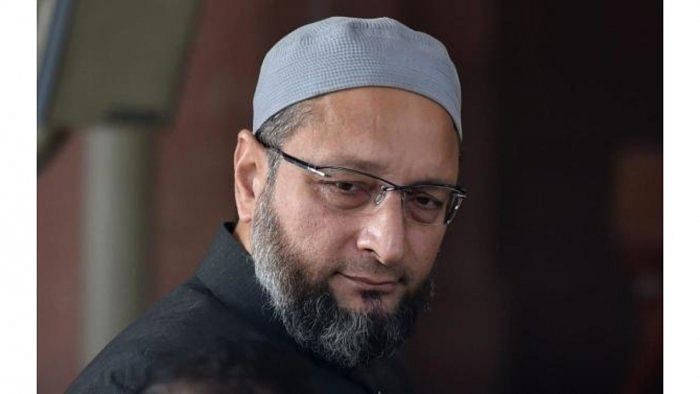
The Dharam Sansads, or religious congregations, that took place over the last two months in Haridwar in Uttarakhand, Chhattisgarh's Raipur and Prayagraj in Uttar Pradesh, all called for eliminating the nation's largest minority, pushing them out of localities, boycotting them economically, and in one instance impregnating Muslim women by Hindu men. Essentially, these were calls for murder and rape and therefore fit the definition of genocide, which means crimes committed to destroy or eliminate people of a particular racial or religious group.
So it came to pass that on February 3, 2022, shots were fired at the vehicle of AIMIM leader Asaduddin Owaisi when he was returning to Delhi from a poll campaign in UP. Two men were arrested within 24 hours. One of the alleged shooters, Sachin Sharma, according to his social media accounts, is a member of the Bharatiya Janata Party (BJP) and has pictures of himself with MP Mahesh Sharma and UP Deputy Chief Minister Dinesh Sharma. Media reports say that hours before the firing, Sachin Sharma shared on his Facebook account a video of a speech made by Owaisi in which the Hyderabad MP was critical of UP Chief Minister Yogi Adityanath.
Given the terrifying levels of anti-Muslim speech in the last few months, one can only presume that the shooters were inspired to act with impunity because they believed they would ultimately get immunity. After all, an individual named Kapil Gurjar, who fired shots in the air near an anti-Citizenship Amendment Act (CAA) protest site in Shaheen Bagh, Delhi, in the run-up to the assembly elections in the city-state in 2020, would get out of jail quite easily and be photographed joining the BJP in UP's Ghaziabad (the party later reversed the decision due to a media outcry).
It would be a natural progression of thought to words to action when we note that Owaisi was mentioned by name at all the three recent congregations where speakers raved and ranted about Muslims. Therefore, this can be seen as an instance of a threat being put into practice, of words inspiring criminal action. Meanwhile, Owaisi, in his powerful speech in Parliament, refused the highest Z level security offered to him and said he would prefer to be an "A" category citizen.
So, who exactly is Asaduddin Owaisi and what is his importance today? He is arguably the most influential and forceful Muslim voice in Indian public life today. He has a fan following among Muslims who see him as an individual who articulates their problems and fears in an age when traditional secular parties have been compelled to avoid showcasing Muslims or raising their issues, even if they are seeking minority votes.
In Uttar Pradesh, which has a 20 per cent Muslim population, there is admiration for Owaisi, and his speeches are listened to on mobile phones in areas where minorities live. Yet, this does not translate into votes for his party in the state. In the 2020 Bihar assembly election, the AIMIM had won five assembly seats in the Muslim dominated part of the state, known as Seemanchal. In doing so, the AIMIM had brought down the tally of the Rashtriya Janata Dal (RJD)-led alliance that lost the state narrowly to the BJP-Janata Dal (United) alliance. However, indications from the ground do not suggest that the AIMIM could repeat the Bihar performance in UP.
However, in the backdrop of the election, some commentators see the attack on the Hyderabad MP's car not as a lone wolf attack but as a false flag operation designed to communalise the ongoing assembly poll. The pockets with the largest Muslim populations vote in the first two phases. One theory goes that attacking Owaisi could lead to Hindu-Muslim tension and impact the polls in two ways, both of which could be advantageous to the BJP. First, if Muslims got emotional and outraged, that would lead to counter polarisation among Hindus (this has not happened). Second, it would give a higher profile to Owaisi and the AIMIM candidates who can cut some votes of the minority community, most of which are headed to the Samajwadi Party (SP)-led front.
So, is Owaisi a vote-cutting agent of the BJP? Actually, most average Muslims do not think so, although some analysts in the Urdu press say so. But many young Muslims, alienated, jobless, communally profiled and therefore with few prospects outside the ghetto, describe him as the last man standing up and speaking for the community. But on the question of actually voting for him, there is still a debate on whether it would be a wasted vote in the state election, particularly as the SP-led front is seen as leading the fight against the ruling BJP.
Owaisi himself is socially a conservative, and therefore many liberal Muslims are uncomfortable with the idea of the community he represents. Yet, he does speak out on issues on which many political parties claiming to represent minorities have become speechless. When confronted with why the so-called secular parties keep attacking him, Owaisi has the following response. That when any election takes place, "The people I call the Chaudharys of Indian democracy tell Muslims that it is a matter of their life and death and they must keep secularism alive by voting for them." Therefore, he says, political parties are "training Muslims to live in fear and to render all their other issues such as education, livelihood, equality, irrelevant." Then when the elections are over, he says, Muslims continue to die every day.
Today, in the midst of death threats and genocidal speech, attacks on Muslim dress codes and spaces for prayer, this does not sound alarming but realistic.
(Saba Naqvi is a journalist and an author.)
Disclaimer: The views expressed above are the author's own. They do not necessarily reflect the views of DH.
Check out DH's latest videos: